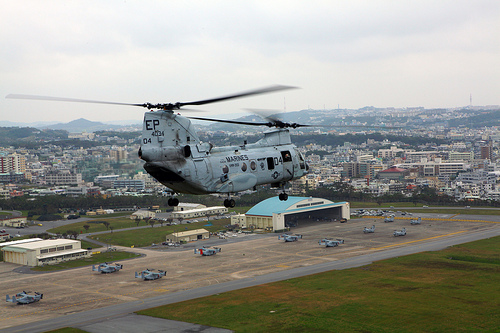Construction of a new base is likely to be a decade-long operation. Nakaima’s approval clears the last hurdle in the relocation of Futenma, which has been a stumbling block in relations between Tokyo and Washington for the last 17 years, and the implementation of which may bolster Japanese Prime Minister Shinzo Abe’s credentials in America after years of friction over the issue.
Japan and the United States first agreed to close Futenma and build a substitute facility in 1996 after a string of crimes committed by American servicemen in Okinawa generated widespread opposition to the US military presence. Later in 2006 the two governments reached an agreement for the relocation of the base to Nago City where another US base, Camb Schwab, is located. It became part of a larger plan to reduce the US presence in Okinawa and was followed by 2006 and 2009 agreements concerning the transfer of over 9000 US Marines from Okinawa to other parts of the Asia Pacific, including Guam.
The fate of the base was left in limbo, however, due to a strong opposition to the relocation plan from both the local government and Okinawan citizens. Crimes, noise and social pollution, military accidents, as well as an oversized financial burden from maintaining the bases have caused the locals to protest in thousands against the US deployment. The anti-base sentiments were given new life during the 2009–2012 rule of the Democratic Party of Japan, with then Prime Minister Yukio Hatoyama presiding over the greatest period of turmoil and confusion in the US-Japan alliance.
Until recently Governor Nakaima has been a vocal opponent of relocating Futenma Air Base up north (moving Futenma outside Okinawa prefecture was one of his election pledges) which makes his approval all the more surprising. As Nakaima stated during a news conference, Okinawan officials had examined the documents provided by the central government and concluded that the current plan provided for all the necessary measures of environmental protection and met the requirements for landfill works. The key factor, however, was Prime Minister Abe’s personal promise to allocate ¥300 billion (US$2.9 billion) for the promotion of Okinawa’s economy each year until 2021, with another ¥340 billion already set aside for 2014.
However, breaking the Futenma impasse seems to be marred by the fact that the current relocation plan only entails building a substitute base in a different part of the island, not the actual drawing down of the US military presence in Okinawa. And without reducing the burden on local communities, the United States will not be able to enhance Okinawan public support for the alliance.
But the very possibility of America considerably cutting back their presence on the southern island is slim at best, especially in light of Washington’s heralded ‘pivot’ to Asia, with a view to deploy more forces in the region. Okinawa is dubbed by the US military as ‘a keystone of the Pacific’, due to its strategically valuable location close to the Taiwan Strait, the Korean Peninsula and China, and its importance for the implementation of the Guam agreement.
Nakaima’s ‘green light’ to the relocation plan is also a big personal victory for Abe. Many members of the Clinton administration responsible for the 1996 agreement later returned to the Obama administration and were irritated by the Japanese government’s inability to fulfill the arrangement. But in persuading Nakaima to approve the relocation, Abe has effectively removed the most sensitive issue of the last 17 years from the US-Japan relationship’s agenda. US Secretary of Defense Chuck Hagel called the Okinawan government’s decision a milestone, demonstrating that the US-Japan alliance is still capable of managing complex problems to deal with 21st-century security challenges and taking the relationship to the next level.
The timing of the decision seems important as it came amid China’s contentious behaviour in the East China Sea with the Chinese government setting up an air defence identification zone that includes the disputed Senkaku/Diaoyu islands. It also came shortly after Abe’s visit to the controversial Yasukuni Shrine, which America expressed disappointment over. Still, solving the issue after nearly two decades of political gridlock should provide a great boost for US-Japan bilateral ties after their cooling under the Democratic Party of Japan.
Dmitry Filippov is a postgraduate student at the School of East Asian Studies, University of Sheffield.


This report omits important aspects of the story. First, far from clearing “the last hurdle”, Gov. Nakaima’s landfill approval was followed by the re-election of Nago Mayor Inamine, a fierce opponent of moving the base to his town. And with calls for Nakaima to resign, he may be replaced with someone who keeps his promises. If the Abe government uses force in an effort to “sacrifice” Okinawa, local opposition may rise to levels yet unseen, in which case those looking for “a great boost for US-Japan bilateral ties” will be sorely disappointed.
The article seems to assume that a shiny new Marine base is actually necessary. But Peter Ennis writes that “Only decades of inter-service rivalries has prevented the functions at Futenma from being integrated into Kadena.” ( http://www.dispatchjapan.com/blog/2013/12/abe-scrambling-for-okinawa-deal.html ) Apparently it bears repeating: just because the Pentagon wants something doesn’t mean it fulfills a genuine security need.
At any rate, there’s no reason the base has to be in Okinawa, which hosts 75 per cent of all US bases in Japan on a prefecture with 0.6 per cent of Japan’s land area. If the only prefecture Abe has any hope of bribing and browbeating into acquiescing to a new base is the least politically powerful and most economically disadvantaged, then it’s fair to ask if Japan’s public is as convinced of its necessity as are some western analysts.